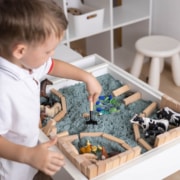3 Ways to Foster Assertive Communication in Children
by Toriann Clarke, MA, LPC, NCC
Have you ever asked your child a question and they clam up and refuse to speak? What about when you witness them agreeing to something and they appear visibly uncomfortable? Or when your child cannot get their way and they exhibit behaviors such as yelling, screaming, and throwing things?
These are all moments that suggest your child has difficulty expressing themselves and may benefit from assertive communication skills. Assertive communication is a way of communicating where the person is able to express their feelings while also respecting the boundaries of others. Assertive communication is a way to assist children in better expressing themselves, increasing self-esteem, and building healthy relationships. Here are a few tips for parents to aid their children in assertively communicating.
Tip #1 How about You?
Before we can suggest tips and tricks on how to be more assertive, we have to understand that communication skills are a learned behavior. When you become angry, disappointed, happy, and sad, how do you express it? Are there any similarities to how you and your child express emotion? If you already have an idea of how you would like for them to communicate appropriately, it may be helpful to begin expressing yourself in that way. Children learn through modeled behaviors. The modeling that parents engage in may be intentional or unintentional. Children pick up on the small variances in parent behavior and respond accordingly. It can be helpful for parents to pay attention to how their children ask for things and how they are responding.
Tip #2 “I Message”
These can take place regardless of your mobile device provider! An “I Message” is a great way to introduce assertive communication to a child and it can be modeled.
I feel _________ because ________. I want/need ____________.
It starts with the basic premise of identifying and accepting one’s own feelings. The next step is explaining why they feel that way. It ends with the person expressing their wants and needs. This model is helpful because it allows children to express their opinions about the situation and identify potential solutions. The model itself may feel rigid when spoken, but as the child begins to express themselves more often, it may begin to flow more naturally.
“I Messages” are a great start for children who struggle with expressing themselves and allows them the opportunity to get used to identifying emotions and learning to respond to them in a healthy way.
Here are a few examples of how a parent and a child could use I Messages to express their emotions and make a related request.
- Child: I feel sad because we did not have enough time to get ice cream. I want to leave earlier next time so we can get ice cream.
- Parent: I feel nervous because I could not see you at the park. Next time, I need you to let me know where you are going.
Tip #3 Fostering a Safe Space
When children begin to try and express themselves assertively, one of the defining markers of whether they will continue to do so is how it is received. In order for children to continue to use assertive communication, they will need to be encouraged to do so by parents who also speak assertively. It is very helpful for parents to listen attentively to their child’s concerns and respond calmly.
We can always change when we are willing to change. When parents begin to use assertive communication with children, they can express themselves safely and healthily. It allows them to have an opportunity for their needs to be met, for them to be able to advocate for themselves, and to have healthy relationships with others who are also able to express themselves assertively.








